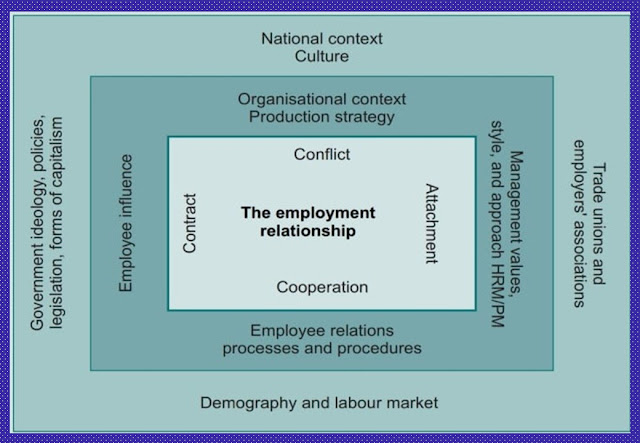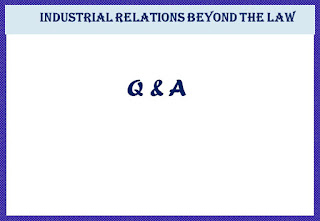Rights under Constitution of Pakistan
Constitution
of Pakistan is the supreme law of the country and all laws passed are in line
with the Constitution. Constitution has undergone various amendments. So far
twenty-five amendments have been taken place.
Articles
8 to Article 28 of the 1973 Constitution describe the Fundamental Rights
available to all citizens of Islamic Republic of Pakistan. Article 4 describes
that right of individual shall be dealt in accordance with law.
Articles applicable on employment
affairs are as under: -
Article 3. Elimination of exploitation:
The
State shall ensure the elimination of all forms of exploitation and the gradual
fulfillment of the fundamental principle, from each according to his ability to
each according to his work.
Article 4. Right of individuals to be dealt with in
accordance with law, etc.
1)
To enjoy the protection of law and to
be treated in accordance with law is the inalienable right of every citizen,
wherever he may be, and of every other person for the time being within
Pakistan
2)
In particular :-
a)
no action detrimental to the life,
liberty, body, reputation or property of any person shall be taken except in
accordance with law;
b)
no person shall be prevented from or
be hindered in doing that which is not prohibited by law; and
c)
no person shall be compelled to do
that which the law does not require him to do.
Article 9. Security of person:
No
person shall be deprived of life or liberty save in accordance with law.
Article 10-A. Right to fair trial:
For
the determination of his civil rights and obligations or in any criminal charge
against him, a person shall be entitled to a fair trial and due process.
Article 11. Slavery, forced labour, etc. prohibited:
1)
Slavery is non-existent and forbidden
and no law shall permit or facilitate its introduction into Pakistan in any
form.
2)
All forms of forced labour and traffic
in human beings are prohibited
3)
No child below the age of fourteen
years shall be engaged in any factory or mine or any other hazardous employment
4)
Nothing in this Article shall be
deemed to affect compulsory service:-
a)
by any person undergoing punishment
for an offence against any law; or
b)
required by any law for public purpose
provided that no compulsory service shall be of a cruel nature or incompatible
with human dignity
Article 17. Freedom of Association:
1)
Every citizen shall have the right to
form associations or unions, subject to any reasonable restrictions imposed by
law in the interest of sovereignty or integrity of Pakistan, public order or
morality
2)
Every citizen, not being in the
service of Pakistan, shall have the right to form or be a member of a political
party, subject to any reasonable restrictions imposed by law in the interest of
the sovereignty or integrity of Pakistan and such law shall provide that where
the Federal Government declares that any political party has been formed or is
operating in a manner prejudicial to the soverignty or integrity of Pakistan,
the Federal Government shall, within fifeen days of such declaration, refer the
matter to the Supreme Court whose decision on such reference shall be final.
3)
Every political party shall account
for the source of its funds in accordance with law
Article 18. Freedom of trade, business or profession,
Subject
to such qualifications, if any, as may be prescribed by law, every citizen
shall have the right to enter upon any lawful profession or occupation, and to
conduct any lawful trade or business
Provided that
nothing in this Article shall prevent:-
1)
the regulation of any trade or
profession by a licensing system; or
2)
the regulation of trade, commerce or
industry in the interest of free competition therein; or
3)
the carrying on, by the Federal
Government or a Provincial Government, or by a corporation controlled by any
such Government, of any trade, business, industry or service, to the exclusion,
complete or partial, of other persons.
Article 25. Equality of citizens:
1)
All citizens are equal before law and
are entitled to equal protection of law.
2)
There shall be no discrimination on
the basis of sex
3)
Nothing in this Article shall prevent
the State from making any special provision for the protection of women and
children.
Article 37(e) Promotion of Social justice and
eradication of social evils,
The
State shall:
(a) promote,
with special care, the educational and economic interests of backward classes
or areas;
(b) remove
illiteracy and provide free and compulsory secondary education within minimum
possible period;
(c) make
technical and professional education generally available and higher education equally
accessible to all on the basis of merit;
(d) ensure
inexpensive and expeditious justice;
(e) make
provision for securing just and humane conditions of work, ensuring that
children and women are not employed in vocations unsuited to their age or sex,
and for maternity benefits for women in employment;
(f)
enable the people of different areas,
through education, training, agricultural and industrial development and other
methods, to participate fully in all forms of national activities, including
employment in the service of Pakistan;
(g) prevent
prostitution, gambling and taking of injurious drugs, printing, publication,
circulation and display of obscene literature and advertisements;
(h) prevent
the consumption of alcoholic liquor otherwise than for medicinal and, in the
case of non-Muslims, religious purposes; and
(i)
decentralise the Government
administration so as to facilitate expeditious disposal of its business to meet
the convenience and requirements of the public.




















